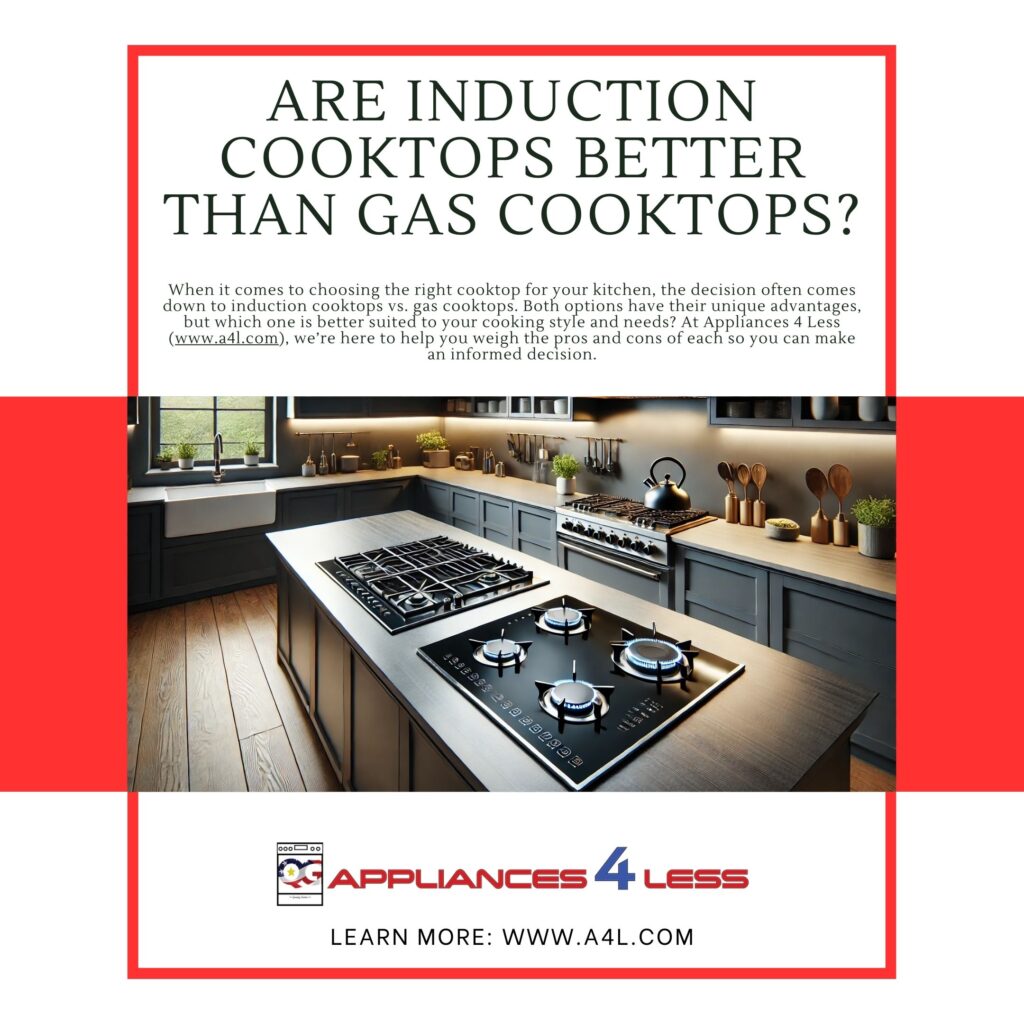When it comes to choosing the right cooktop for your kitchen, the decision often comes down to induction cooktops vs. gas cooktops. Both options have their unique advantages, but which one is better suited to your cooking style and needs? At Appliances 4 Less (www.a4l.com), we’re here to help you weigh the pros and cons of each so you can make an informed decision.

What Are Induction Cooktops?
Induction cooktops use electromagnetic energy to heat pots and pans directly. Instead of heating the cooktop surface, induction cooktops generate heat within the cookware itself. This makes them highly efficient and precise, as the heat is concentrated where it’s needed most.
What Are Gas Cooktops?
Gas cooktops use an open flame to heat cookware. The flame is produced by burning natural gas or propane, which provides immediate heat that can be easily adjusted. Gas cooktops are known for their responsiveness and versatility, making them a favorite among professional chefs.
Pros of Induction Cooktops
- Energy Efficiency- Induction cooktops are more energy-efficient than gas cooktops because they transfer heat directly to the cookware with minimal energy loss. This can lead to lower energy bills and a more environmentally friendly kitchen.
- Safety- Since induction cooktops only heat the cookware and not the surrounding surface, they are safer to use. The cooktop remains cool to the touch, reducing the risk of burns and accidental fires.
- Precision and Speed- Induction cooktops offer precise temperature control, allowing you to make quick adjustments with ease. They also heat up faster than gas cooktops, making them ideal for time-sensitive cooking tasks.
- Easy Cleaning- The flat, smooth surface of induction cooktops makes them easy to clean. Spills and splatters don’t burn onto the surface, so a simple wipe-down is usually all that’s needed.
Cons of Induction Cooktops
- Cookware Compatibility- Induction cooktops require magnetic cookware to function. This means you may need to invest in new pots and pans if your current cookware is not compatible.
- Higher Initial Cost- Induction cooktops tend to be more expensive upfront than gas cooktops. However, the energy savings over time can help offset the initial investment.
Cons of Gas Cooktops
- Energy Inefficiency- Gas cooktops are less energy-efficient than induction cooktops because much of the heat escapes into the air rather than being transferred directly to the cookware. This can result in higher energy bills.
- Safety Concerns- The open flame of a gas cooktop poses a greater risk of burns and fires. Additionally, gas leaks can be a safety concern if the cooktop is not properly maintained.
- Cleaning Challenges- Cleaning a gas cooktop can be more challenging due to the grates, burners, and crevices that can accumulate grease and food debris. Regular maintenance is required to keep it in good condition.
Conclusion: Which Cooktop Is Right for You?
The decision between induction cooktops and gas cooktops ultimately depends on your cooking style, budget, and kitchen needs. Induction cooktops are ideal for those who prioritize energy efficiency, safety, and precision, while gas cooktops are preferred by those who value instant heat control, versatility, and a traditional cooking experience.
Visit Appliances 4 Less (www.a4l.com) to explore our wide selection of both induction and gas cooktops, and find the perfect fit for your kitchen.
Induction Cooktops, Gas Cooktops, Induction vs. Gas, Best Cooktop for Cooking, Cooktop Comparison